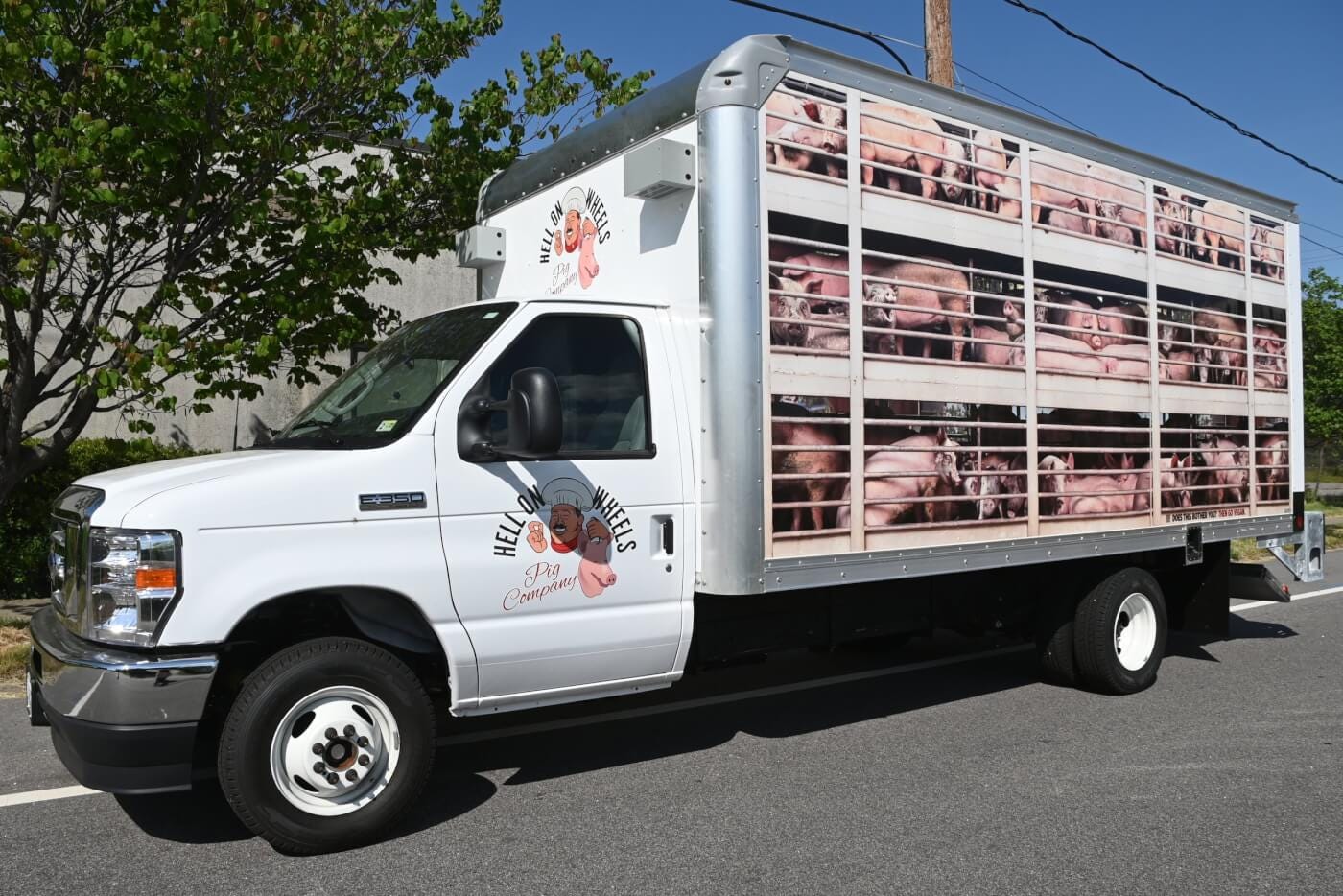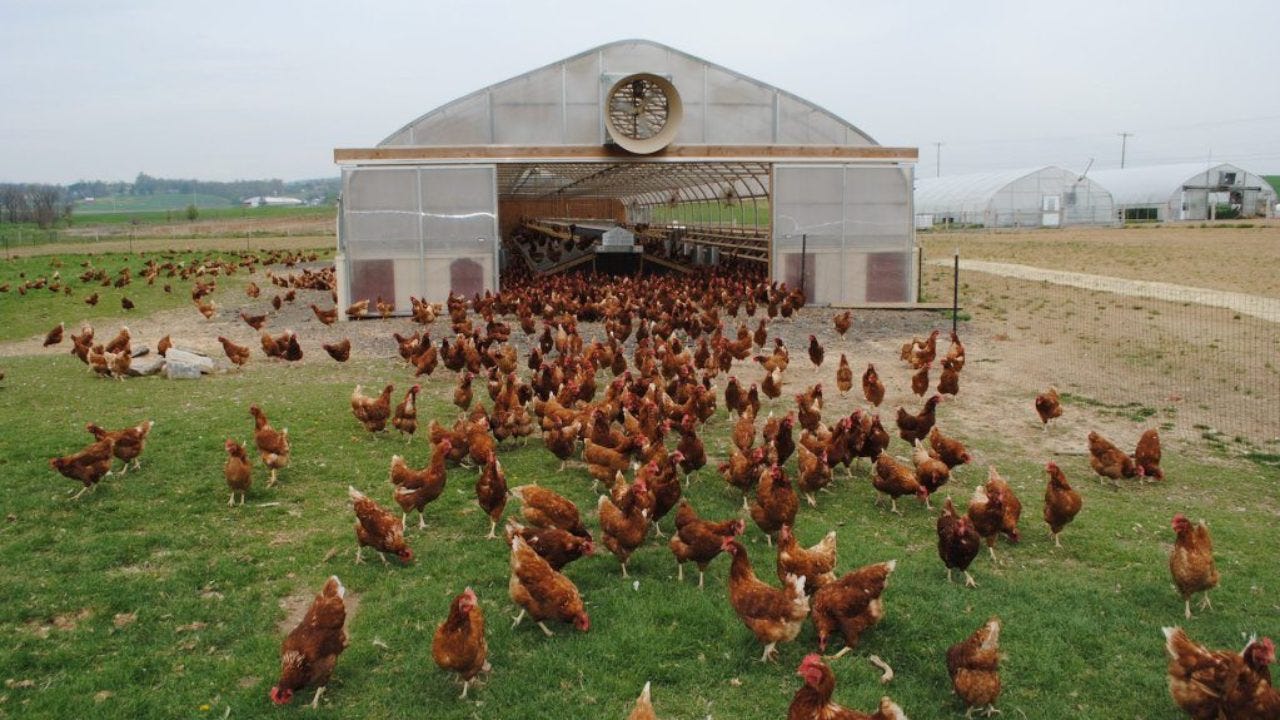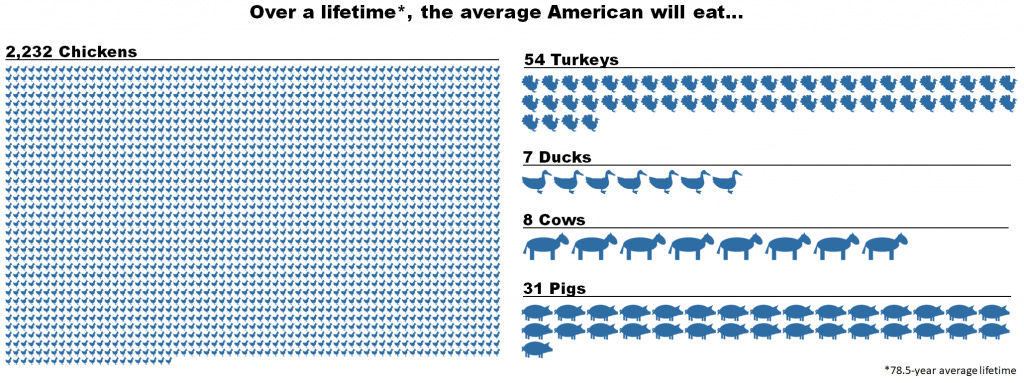How To Cause Less Suffering While Eating Animals
It's surprisingly easy to be a much more ethical omnivore
You can cause vastly less suffering to animals without going vegan
(This is an important article, so I’d encourage you to restack it and share it with others).
In my view, eating meat in the modern era is seriously morally wrong. Most animals live extremely terrible lives in factory farms—because of a century of hideous genetic engineering, they live in constant pain. Around 99% of animals live in dark, cramped, squalid conditions, with too little space to move or spread their wings, choking on filth and ammonia and feces. Horrific mutilation—tail-docking, debeaking, dehorning—is routine. Transport is stressful and often fatal.
Despite this, most people continue to eat meat, generally without thinking much about their meat consumption. This is a mistake; it’s easy to cause vastly less cruelty with your animal consumption even if you keep eating animal products. While I think meat eating is wrong, it’s not all equally wrong. There are three big ways you can cause much less suffering through your consumption of animal products.
1 Offset
The first way is: offset. Offsetting is the practice of donating to charities that reverse the negative impact one has on the world. For example, if you fly a lot, you might donate to offset your carbon emissions by giving money to a charity reversing carbon emissions. Overall, by offsetting you make your aggregate impact zero or positive.
Now, there are some thorny ethical questions about the permissibility of offsetting (for instance, it’s not typically thought that an assassin can get off scot-free by donating a few thousand bucks to the Against Malaria Foundation each time they perform an assassination). But clearly offsetting is vastly better than doing nothing. It is much better to have a neutral impact on animals than to have a strongly negative impact on them.
I’ve written more about offsetting here. To offset your negative impacts on each of the animals you eat, it only takes about 23 dollars a month. It costs less than a dollar per day to make sure that every kind of animal is made better off by your existence. I’d recommend offsetting by donating to one of the top Animal Charity Evaluators charities, which have been found, through rigorous study, to be the most effective organizations for helping animals. You can also donate to Farmkind’s general fund (they're fully matching donations from Bentham's Bulldog readers who use the code “bentham”), which splits the money it receives across the highly effective animal charities—if you give 23 dollars a month to Farmkind, you won’t have a negative impact on any animal species, and you will have an extremely positive impact on some!
I think it’s better to be vegan and donate to effective animal charities than to just donate, but if you do eat meat, donating to effective animal charities is a super simple way of undoing the suffering that you cause. It strikes me as the bare minimum. If you are going to pay for animals to be subjected to cruelty, you should make sure that in the aggregate, animals aren’t made worse off because of you.
2 Buy pasture raised animals
The next big way to reduce animal suffering is to get animal products from a more ethical source. Not all animal products are equally bad. When purchasing chicken or eggs, try to get them pasture-raised. A pasture-raised animal was allowed to roam out in the fields and had adequate space. While a lot of the labels slapped on animal products are bullshit to varying degrees, pasture-raised is not—it actually means the animal got to roam around in a field with adequate space for its whole life.
Unfortunately, many terms that you’d think mean the animals are pasture-raised don’t really. As the good folks over at A Greener World write:
Labels that really mean animals are pasture-raised are: Certified Animal Welfare Approved by AGW, Certified Grassfed by AGW, Certified Non-GMO by AGW and Certified Regenerative by AGW. While Certified Humane doesn’t require all animals to be pasture-raised [to receive the] label, they have an optional pasture-raised standard that some of their certified farms use.
There’s some chance an animal product will falsely claim to be pasture raised, so make sure to look for an independent certification. Other labels mostly don’t mean much but are usually better than nothing.
Free range just means the animal has access to outdoors. But in practice, this typically means that tens of thousands of animals are crammed in crowded indoor conditions with a small outdoor gate that only a few can go through. It’s better than nothing but still very bad.
Cage free just means that rather than stuffing 4 chickens in a cage where they can’t move, they stuff 100,000 in a barn where they can’t move. Now admittedly it’s somewhat better, but still extremely bad.
Organic also means that they can be wildly overcrowded and mutilated so long as they’re fed the right kind of diet.
A nice-sounding label doesn’t mean the animal was treated well. Before buying an animal based on a label, make sure you know what the label means and that it means the animals actually lived a nice life in a field. Remember, the industry is trying desperately to lie to you. In practice, people who say they only eat high-welfare meat almost always end up eating meat from factory farms—so make sure, if you’re trying to eat high-welfare meat, to be careful and judicious. Dairy won’t usually say “pasture-raised,” but you can look for the aforementioned accreditation standards.
(Also, if you go full Vasco and think the main impact of one’s meat consumption comes from its impact on insects, animals that roam about consume more food and decrease insect populations more).
3 Eat bigger animals
By changing which animals you eat, you can vastly diminish the amount of animal suffering you cause. Different animals cause vastly different amounts of animal suffering. Chickens are much smaller than cows, so over a lifetime, the average person eats thousands of chickens and just a few cows. Avoiding chicken—especially factory-farmed chicken—and eggs are the most important.
It’s also important to avoid farmed fish and shrimp which are small, treated poorly, and live for long periods on the farm. Americans tend to eat hundreds of shrimp annually and thousands of fish over the course of their life. Fish and shrimp both live in extremely terrible conditions, with about half of shrimp dying before slaughter. Also avoid honey given the astronomical suffering it causes to bees.
A decent heuristic is: the bigger the animal, the better. Dairy is the least bad animal product. Cows produce so much dairy that over the course of your life, you’ll only consume around the milk production of around one cow. Beef is also vastly less bad than others. So is lamb. Pigs are worse than cows. Chickens, turkey, and eggs are worse than pig, and farmed seafood is probably even worse than chicken. Wild caught fish is also one of the less bad ones.
If you take any one of these items of advice, you can easily eliminate the vast majority of suffering caused by your consumption of animals products. If you only purchase high-welfare animals, offset, or restrict your animal-product consumption to large animals, you can easily eliminate 90% or more of the suffering you caused through your consumption of animal products. I don’t think you should eat animals, but if you are going to eat animals and you care about animal welfare, these things seem like no-brainers. You should be willing to endure minor sacrifices so animals don’t have to be tortured in cages for your sake.





Great article. If anyone is looking for a resource on animal welfare certifications, ASPCA has created a database: https://www.aspca.org/shopwithyourheart/consumer-resources/shop-your-heart-grocery-list
I setup reoccurring monthly donations to FarmKind (and GiveWell) yesterday, in large part because of your writing. Thanks for everything you do and I can't believe I missed my chance to use code bentham!